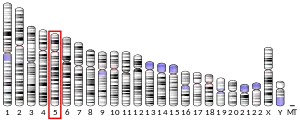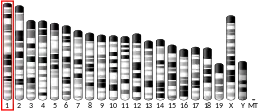Diphosphoinositol pentakisphosphate kinase 2 is a protein that in humans is encoded by the PPIP5K2 gene. [5]
Function
Inositol phosphates (IPs) and diphosphoinositol phosphates (PP-IPs), also known as inositol pyrophosphates, act as cell signaling molecules.
HISPPD1 has both IP6 kinase (EC 2.7.4.21) and PP-IP5 (also called IP7) kinase (EC 2.7.4.24) activities that produce the high-energy pyrophosphates PP-IP5 and PP2-IP4 (also called IP8), respectively (Fridy et al., 2007 [PubMed 17690096]).
References
- 1 2 3 GRCh38: Ensembl release 89: ENSG00000145725 - Ensembl, May 2017
- 1 2 3 GRCm38: Ensembl release 89: ENSMUSG00000040648 - Ensembl, May 2017
- ↑ "Human PubMed Reference:". National Center for Biotechnology Information, U.S. National Library of Medicine.
- ↑ "Mouse PubMed Reference:". National Center for Biotechnology Information, U.S. National Library of Medicine.
- ↑ "Entrez Gene: Diphosphoinositol pentakisphosphate kinase 2". Retrieved 2017-03-21.
Further reading
- Rose JE, Behm FM, Drgon T, Johnson C, Uhl GR (2010). "Personalized smoking cessation: interactions between nicotine dose, dependence and quit-success genotype score". Mol. Med. 16 (7–8): 247–53. doi:10.2119/molmed.2009.00159. PMC 2896464. PMID 20379614.
- Wang H, Falck JR, Hall TM, Shears SB (2011). "Structural basis for an inositol pyrophosphate kinase surmounting phosphate crowding". Nat. Chem. Biol. 8 (1): 111–6. doi:10.1038/nchembio.733. PMC 3923263. PMID 22119861.
- Weaver JD, Wang H, Shears SB (2013). "The kinetic properties of a human PPIP5K reveal that its kinase activities are protected against the consequences of a deteriorating cellular bioenergetic environment". Biosci. Rep. 33 (2): e00022. doi:10.1042/BSR20120115. PMC 3564036. PMID 23240582.
- Yong ST, Nguyen HN, Choi JH, Bortner CD, Williams J, Pulloor NK, Krishnan MN, Shears SB (2015). "Identification of a functional nuclear translocation sequence in hPPIP5K2". BMC Cell Biol. 16: 17. doi:10.1186/s12860-015-0063-7. PMC 4472268. PMID 26084399.
This article incorporates text from the United States National Library of Medicine, which is in the public domain.
This article is issued from Wikipedia. The text is licensed under Creative Commons - Attribution - Sharealike. Additional terms may apply for the media files.



